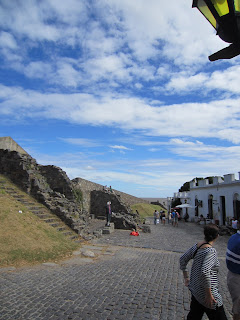I've just returned from my first trip outside the city and I already wish to go back. I did what the British and American expat community has termed "the run" to Colonia. Every three months Americans, Brits, and foreigners of several other nationalities as well need to make "the run" outside Argentina in order to renew their visa for another three months. Some expats go to Chile, others go to Paraguay, most, however, do the short one or two day trip to the tiny riverside town of Colonia Uruguay.
It was pouring in Buenos Aires that morning but once we left the city the sky cleared and we could see the rain wall over downtown.
There are three ferry companies that make trips to Colonia from Buenos Aires. For convenience-sake I took the Buquebus ferry. The ride was about three hours to get to Colonia. For the faster one hour boat the price would have been about double. As I was in no rush I opted for the slow vessel.
After living in a city for three months it is difficult to describe the feeling of walking off the boat to quiet, peaceful streets, a slower lifestyle, and a laid-back atmosphere.
You can see the shore of the river from the picture above. Colonia is a very small town with a population of about 20,000.
Above you can see the another view of one of the quiet streets. All the motor bikes are for rent.
I decided to get a little ice cream and enjoy it in a quiet park in the center of town. The park and the ice cream were both refreshing necessities. I chose Italian chocolate with cherries and Tiramisu.
It was so nice to sit in a park that was not surrounded by the hum and honking of automobiles and the drone of airplanes.
Here is a photo of what remains of the old wall that used to surround the colonial settlement before it expanded.
The Basilica of the Holy Sacrament located inside the old section of the city. Built circa 1808.
The lighthouse I believe was built in the mid-19th century while the ruins surrounding it are from a 17th century colonial era convent (Convento de San Francisco y Faro).
Entering Antigua Colonia del Sacramento (Old Colonia)
A view of me from the top of the lighthouse. Behind me is the riverfront and way off in the distance is the ferry launch where I first arrived.
I wish I spent more time here. The streets are just so much more peaceful than in Buenos Aires.
And there's a beach!!! I've heard the water is also clean enough to swim in too. Not so on the BA side.
Colonia: The perfect therapy for the countryside native to get his hillbilly fix.
Next time it's go kart racing!!! Maybe.
Kyle
Buenos Aires, Argentina












